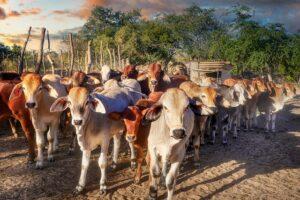MATE supports the development of agriculture in the Republic of Chad
The Hungarian University of Agriculture and Life Sciences (MATE) supports the development of agriculture in the Republic of Chad as part of the cooperation agreement concluded by Hungary and Chad. The agricultural program is linked to the humanitarian development and diplomatic mission in the African country.

(Photo: Pixabay)
Ministerial Commissioner László Máthé, Special Envoy for Sáhel, said on Tuesday morning in the current program of the M1 channel, that the Sahel zone is an area of approximately 7 million square kilometers from Mauritania to the coast of Sudan, of which the Republic of Chad is the only country that represents significant stability compared to the Sahel zone. Strengthening the country means indirect security for Hungary, he declared.
The special commissioner explained that a comprehensive program is being launched, a medical mission was recently implemented, and it will also have a defense element in addition to agricultural development
László Máthé emphasized that Hungary wants to help locally by improving food safety and reducing the effects of climate change. As he said, it is necessary to prevent large crowds from being forced to leave their homes. Csaba Gyuricza, rector of MATE, said that food has become the most important strategic product, as well as a security issue in the world. Hungary already has experience in the export of agricultural knowledge, as Hungarian agriculture is well-known and recognized, there is sufficient technology, technique, and seed that can be deployed; Model farms have already been established in several places in Africa. He added: the program also strengthens the foreign trade activities of the agrarian, Hungarian companies can appear in the region by deploying their technology. Csaba Gyuricza announced that the first training programs will start in November on animal husbandry, the use of laboratory equipment related to animal husbandry, and the cultivation of fodder crops, and they want to hand over the first diplomas in December. He emphasized that the region is a “living laboratory of climate change”, so their specialists can examine the agricultural transformations associated with climate change, what can be expected in Central Europe in the coming decades, he said.
MTI
Related news
Not a turnaround, but consolidation: an agricultural outlook for 2026
🎧 Hallgasd a cikket: Lejátszás Szünet Folytatás Leállítás Nyelv: Auto…
Read more >Protein, gut health and mental wellbeing – these trends will shape global food innovation in 2026
🎧 Hallgasd a cikket: Lejátszás Szünet Folytatás Leállítás Nyelv: Auto…
Read more >Related news
Valentine’s Day on Kifli.hu: in addition to classic favorites, everyday attentions are increasingly coming to the fore
🎧 Hallgasd a cikket: Lejátszás Szünet Folytatás Leállítás Nyelv: Auto…
Read more >









